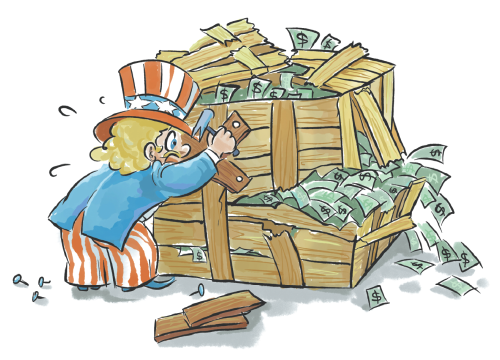US rate hike won't help curb inflation
By Peng Bo | China Daily | Updated: 2022-06-21 06:42

The consumer price index in the United States increased 8.6 percent in May, the highest since 1981, outstripping the market forecast of 8.3 percent. To rein in the ferocious inflation and cool borrowing, the US Federal Reserve raised the interest rate by 0.75 percentage point on June 15, the highest hike since 1994.
But will the Fed's move tame the inflation in the US?
The record high inflation in the US is the result of the long-term relocation of global industrial chains, which cannot be reversed overnight. In the 1980s, the US succeeded in slowing inflation by raising interest rates. But it could do so only because China and other East Asian countries provided the world, including the US, with huge amounts of high-quality products at relatively low prices, and thus helped protect the livelihoods of the American people. Americans, including former Fed chairman Alan Greenspan, have acknowledged that.
Indeed, the US economy rests on the coordinated development of global industries. Separated from the global industrial chains, the US would not have been able to achieve the current level of development and ensure American people's high living standards.
Other factors have also fueled the inflation in the US. To begin with, the COVID-19 pandemic has seriously disrupted the global industry and supply chains, especially the supply of goods in the US. And the large-scale pump priming (actions taken to stimulate an economy, usually during a recession, through government spending, and interest rate and tax reductions) in recent years may have eased the pressure on the economy but it has also exacerbated the imbalance between supply and demand.
Besides, Washington's efforts to check China's rise and change the global economic order to its liking are also taking a toll on the US.
Raising interest rates has always been a double-edged sword. It cannot really curb inflation, and instead may further exacerbate the existing difficulties in the US, as the current economic situation in the US is very different from that in the 1980s. At that time, with the external environment generally improving and domestic production in order, interest rate hikes in the US had a positive effect. But now the conditions have changed.
The fundamental problem in the US today is the hollowing out of industries and the inefficiency of the industry and supply chains. For example, nonfarm labor productivity plummeted 7.3 percent in the first quarter of 2022 compared with the same period last year-the largest decline since the third quarter of 1947, according to the Bureau of Labor Statistics.
On the other hand, the US' China-containment policy has weakened the country's economic foundation, greatly undermining its cooperation with the rest of the world. Also, the US' monetary stimulus has disrupted the domestic job market and production activity. And none of this can be resolved by interest rates hikes.
The US raised interest rates by 25 basis points in March, the first hike since it cut interest rates to zero. In April, inflation fell by 0.2 percentage points, from 8.5 to 8.3 percent, but it rebounded to 8.6 percent in May. Which shows raising interest rates will not do much to curb inflation.
On the contrary, higher interest rates will further disrupt global capital flows, hurting production in other countries and supplies to the US. It will also increase the cost of domestic production and accelerate the shift from the real economy to the virtual economy.
Moreover, rate hikes could dampen the gains from the stock market, which has become a priority for the US economy. The S&P 500 has lost 2.7 percent during the one and a half years of Joe Biden's presidency, with stocks plunging 3.9 percent on June 13. However, if the US stock market continues to rise after the interest rate hikes, it will hinder the US industrial structural adjustment process.
Yet the US is not the only economy facing high inflation. Inflation in Europe is on par with the US-inflation reached 8.1 percent in May. This, to a large extent, is due to the spillover effects of the US' economic bungling and its efforts to reshape the world economy according to its preference.
To curb global inflation, therefore, countries need to work closely to initiate global supply-side reform. They should also initiate reform in real production. But that would require the US to change course, and abandon its wrong practices, which have dealt a serious blow to the global economy. For instance, if Washington lifts all the tariffs on Chinese goods, inflation in the US is likely to decline by 1.3 percentage points.
In the era of close global cooperation, by adopting policies and taking actions to check other countries' development, the US will only hurt itself. If it continues to repeat its mistakes, economic hardships across the world will intensify and global inflation will rise further. After all, raising interest rates, which is merely a monetary move to check inflation, cannot solve real economic problems.
The author is an assistant researcher with the Chinese Academy of International Trade and Economic Cooperation.
The views don't necessarily represent those of China Daily.
If you have a specific expertise, or would like to share your thought about our stories, then send us your writings at opinion@chinadaily.com.cn, and comment@chinadaily.com.cn.
























